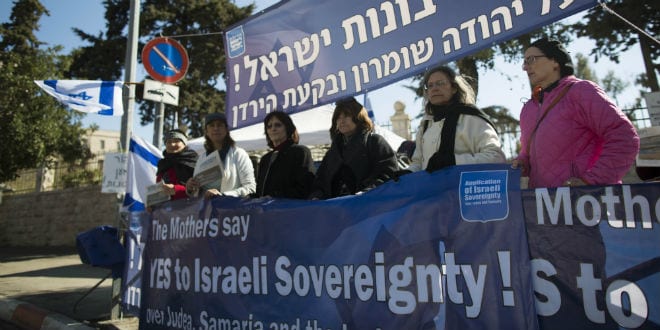As Israel considers extending sovereignty to parts of Judea and Samaria, the settlement movement stands at a critical crossroads. We must learn from our costly mistake during the first Trump administration and embrace pragmatism over idealism and embrace sovereignty over parts of Judea and Samaria at our first opportunity.
In the early morning hours of January 28, 2020, settler leaders snatched defeat from the jaws of victory. At 3 a.m., hours before President Donald Trump was set to announce his “Deal of the Century,” then-chairman of the Yesha Council, David Elhayani, issued an irresponsible statement to Israeli media rejecting Trump’s plan.
Details of the Peace to Prosperity plan had not even been released, yet the settlement leadership had heard from Prime Minister Benjamin Netanyahu the day before that it would be “historic” and that they would be pleasantly surprised, alluding to the fact that it would recognize Israeli sovereignty over large parts of the West Bank. The plan did leave a conditional pathway to Palestinian statehood open, yet the conditions were many.
An all-or-nothing approach
Elhayani, an ideologue committed to an all-or-nothing approach, was livid. “We cannot agree to a plan that will include the establishment of a Palestinian state… even if it means giving up sovereignty in Judea, Samaria, and the Jordan Valley,” Elhayani declared at 3 a.m., hours before the major White House press conference was scheduled.
Elhayani’s statement created an international crisis. By 4 a.m., Trump, Jared Kushner, and ambassador David Friedman were all awake and furious, according to then-Efrat mayor Oded Revivi, who was part of the delegation. Settlement leaders found themselves uninvited from the very ceremony they had flown to Washington to attend.
The consequences of this ideological rigidity have been severe. Had we embraced a pragmatic, phased approach to sovereignty, we would now control the Jordan Valley and Area C as sovereign Israeli territory, and today be discussing Areas B and A. Instead, we face a reality where countries around the world are pledging to follow France’s lead and recognize Palestinian statehood at the United Nations General Assembly next month in New York.
Annexation threats
According to reports, Strategic Affairs Minister Ron Dermer has informed French officials that Israel is considering annexing all of Area C, approximately 60% of the West Bank, where Israel maintains both security and civilian control and where all Jewish communities are located.
This represents a historic opportunity. But there is a danger that the ideological wing of the settler movement may once again choose perfection over progress and protest any decision that doesn’t include all of Judea and Samaria. After all, there are significant biblical heritage sites in Areas A and B, including the Tomb of the Patriarchs in Hebron, Rachel’s Tomb in Bethlehem, and Joseph’s Tomb in Nablus. Yet, we cannot make the same mistake we made in 2020.
Sovereignty over 60% of Judea and Samaria would constitute a major victory for Israel, particularly in the aftermath of October 7 and October 8.
On October 7, Hamas launched its brutal “al-Aqsa Flood,” aimed at conquering not just the Gaza envelope but Jerusalem itself, then cynically used civilian casualties as cover for their war aims. Hamas cares nothing for Gazan civilian lives; they only care about territory. Achieving partial sovereignty would represent a decisive victory over our enemies’ territorial ambition.
On October 8, we witnessed preplanned demonstrations by organized global leftist movements against Israel and supporting “Palestinianism.” As Israel’s military achievements mounted and the delegitimization campaign against Israel required reinforcement, the global Left coalesced around demanding Palestinian statehood. Country after country has since embraced the failed two-state solution in recent months, with France, Canada, the UK, and others pledging to recognize a Palestinian state at next month’s General Assembly.
To counter these coordinated efforts to delegitimize Israel, we must embrace our core legitimacy: Judea and Samaria. This is our biblical heartland and the communities where over half a million Jews live. Efrat, Ariel, and Ma’aleh Adumim must be recognized as much a part of Israel as Tel Aviv or Herzliya. Yes, all areas of Judea and Samaria rightfully belong to Israel, yet declaring sovereignty over a majority does not mean we are giving up on the minority.
The settlement movement cannot repeat the self-defeating perfectionism of 2020. Today’s partial sovereignty can become tomorrow’s complete sovereignty, but only if we accept what is achievable now while continuing to work toward our ultimate goals.
The choice before us is clear: pragmatic progress or ideological paralysis. History will judge us harshly if we again allow the perfect to become the enemy of the good. Zionism developed in phases, step by step, and so it must continue.
The writer, a rabbi, is the founder of Israel365 Action, a new party in the World Zionist Congress advocating for Israeli sovereignty in Judea and Samaria.






